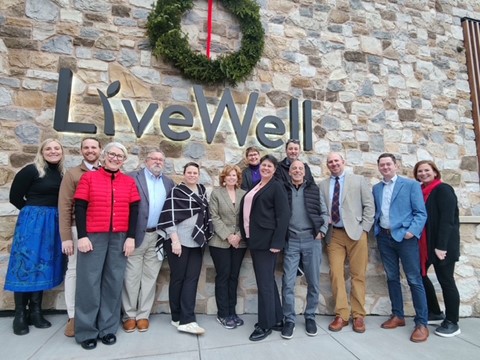
Author:
Kim Warchol, President and Founder of DCS at CPI
Many people with Alzheimer’s, Lewy-body, and other types of dementia are living at home, and this decision isn’t an easy one. The decision to keep someone with dementia at home is not right or wrong-it’s personal. But supporting a loved one with dementia to live their remaining days at home comes with a high amount of responsibility and sacrifice. As the disease progresses there is a significant loss of independence, mobility, and judgment. Challenging distress behaviors like agitation are often prevalent. Thus, there is a significant burden of care, many safety concerns, and stress, that can severely impact quality of life and erode caregiver health. Families, no matter how well meaning, are going to feel overwhelmed and struggle.
It’s not surprising that our home care industry customers tell us the dementia population is growing faster than any of their other client groups. Care for a person with dementia at home requires extraordinary time and energy and the physical and emotional demand on loved ones in caregiver roles is tremendous. For so many reasons the addition of hired help is needed for the person with dementia, and for their families.
I recently interviewed Theresa, the wife of Bob, an 83-year-old man living with Lewy-body dementia. Bob was diagnosed about 7 years ago. Theresa, now 61, and her grown children decided long ago that Bob will always live at home. Round the clock care is needed at this later stage of his disease. His family is extremely loving and supportive. His wife and adult son provide much of the routine care. Other family members also offer assistance as needed, and there is some hired help each day. Even with all this help, there is evidence of this disease claiming more than one victim and unfortunately, there are gaps in our health care system and care delivery that can be clearly identified.
I asked Theresa to describe her experience. She started with her gratitude for her resources, which she said definitely helps. Most notably she spoke of her family support, and her financial resources that enables her to receive hired help. She was quick to point out others in her situation may not be so fortunate as to have these resources available and wondered aloud how they could possibly make it. She was reticent to complain and her commitment to her husband was unwavering as she lovingly explained, “I took a vow to care for him in sickness and in health. This is my duty.”
As the conversation continued there was some willingness to share the impact caring for a loved one at home can have on family caregivers. She said, “The greatest impact on me has been physical. I am slower and I have bad knees. I don’t have time to walk and exercise and I have put off some of my own tests. I have experienced physical decline.” While not communicated directly, I believe this role and all it requires, has also taken another toll. She quietly shared, “It’s a luxury to sit in the sun and watch the hummingbirds and butterflies. I have learned to redirect my own wants.”
I asked what Theresa finds the most helpful, other than the caregiving assistance, and what she might tell another family starting this journey. She suggested learning as much as possible about the disease, being open and honest about it with others, and getting help. She shared, “More understanding about this disease is important. I want more literature. I’d like someone to call and talk to, like we are doing today. I’d like more training about difficult day to day care tasks like how to bathe someone in bed. There simply isn’t enough of this. Definitely not enough education or training is offered to us by our doctor or other healthcare providers.”
We also talked about “Dementia Grief, a process someone with dementia and their loved ones may experience. These typical stages of grief -denial, anger, bargaining, depression, and acceptance- are often experienced when confronted with dementia. I talked about how I have seen many families get stuck in denial, using it as a temporary coping mechanism. This difficulty of “accepting” creates barriers to receiving necessary assessment, treatment, and care. She said, “I don’t think I have ever been in denial. Who would that help? We must live it, have the strength to accept it, and adjust. Denying, anger and holding on to what was, doesn’t help anyone. Knowing what the diagnosis is, understanding the disease and knowing what to expect, helps.”
Theresa’s experience certainly affirms the vital importance of the new innovative CMS Guiding an Improved Dementia Experience (GUIDE) model. There are many families, just like hers, who are living with these tremendous challenges and needs every day, and we can and must help. The proposed comprehensive and specialized dementia care programs and education offered as a part of the GUIDE model via the participating organizations has the potential to help so many families, like Bob and Theresa’s.
And let’s never forget what the most important thing may be. When I asked Theresa how she was doing, she paused, sat back, and inhaled deeply. With tears in her eyes Theresa softly said, “I don’t think anyone has ever asked me that.” So, as we provide our healthcare services and expertise, let’s NEVER forget to ask, listen, and to offer compassion. This may be the most important care component of all.
I will be sharing more from my interview with Theresa in future blogs. Between all that she has learned, and the extraordinary person that she is, Theresa has the experiential knowledge, the positive perspective, and the strength of character that can teach others, and help to make life a better place for those living with dementia and their loved ones. I am honored to share her thoughts with you.
About the Guide Model
At the end of 2022, my professional organization, the American Occupational Therapy Association (AOTA) had the opportunity to provide input to the Centers for Medicare and Medicaid Services (CMS) Innovation team, discussing the potential of an innovative model to better serve people living with Alzheimer's and other dementias at home, and to better support their families. I was one of a small group invited by AOTA to be a part of these discussions with CMS and contribute opinions and expertise as to how our Occupational Therapy profession can help those living with dementia. In addition, we described what types of care and training may be required for best results. The great news is this CMS innovative model was created and is launching.
We are excited for the GUIDE model to now become a part of the home care delivery options available for Medicare and Medicaid beneficiaries who are living with dementia. We are hopeful many qualifying Medicare Part B providers will participate. Successful implementation can improve the quality of dementia care and promote positive outcomes for the person living with dementia, their loved ones, caregivers, and society. We know how important it will be for this innovative program to produce positive outcomes during this 8-year voluntary model period, beginning July 2024.
Achieving positive outcomes requires organizations to have staff members who are knowledgeable and skilled to perform their duties as specialists in dementia care, and in accordance with their role. One key role in the GUIDE model is the Care Navigator. There is a significant amount of training individuals in this role must take in order to satisfy the training requirements, and to be competent in activities such as dementia assessment, care planning, care delivery, and supporting caregivers. In addition, it is fair to say ANY person working on a dementia specialized care team should have quality dementia training, to ensure they have the knowledge and skills to work with this special population. To read more about the GUIDE model and training requirements click here.
If you are planning to participate in the GUIDE model, or if you provide home care to those with dementia as a part of a medical home care agency or companion care organization, we can help. We offer exceptional dementia and behavior training and certifications for all those who work in healthcare, and we have created assessments, care planning and other tools to help implement dementia capable programs. Our clinical team has vast experience working as dementia specialized clinicians, including in the home setting. We have developed the Dementia Capable Care training and resource tools around proven models and our many years of practical and invaluable experience. We know this approach works to improve positive outcomes for the person with dementia, caregivers, and loved ones.
The below is a crosswalk displaying the connections between the training topics required for Care Navigators in the GUIDE model and those covered in our Dementia Capable Care training. Dementia Capable Care training covers the topics italicized.
Table 4. Required Care Navigator Training Topics TopicDementia Capable Care training covers the topics italicized. |
|
|
Background on Dementia |
Overview of dementia as a medical condition; Progression of disease and balancing dementia with other co-morbidities |
|
Overview of Assessments (expand) |
Assessments available related to dementia; Recommendations for a successful assessment |
|
Care Plan (expand) |
What is a care plan; Including beneficiary in the development of plan |
|
Person-Centered Planning |
What person-centered planning means; How to incorporate into planning |
|
Challenging Behaviors |
Behavioral symptom management; Common behavioral changes due to dementia and how to address |
|
Functional Needs |
What are activities of daily living (ADLs) and instrumental activities of daily living (IADLs); Evaluation of ADLs and IADLs; Common changes in ADLs and IADLs due to dementia and how to address; Medication monitoring and maintaining a medication schedule |
|
Advanced Care Planning |
What is an advance medical directive and POLST form; How to assist beneficiary in advance care planning |
|
Decision-Making Capacity |
What is capacity for medical decision-making; What it means when a beneficiary does not have capacity for medical decision-making; supported decision-making |
|
Safety |
Considerations for safety at home, in public, and driving; elder abuse, neglect, and financial exploitation; access to weapons and dangerous substances |
|
Communication |
Communication strategies for persons with dementia and their caregivers |
|
Coordination of medical care and community services |
Communication with clinical providers; Supporting beneficiary in transitions between settings; Accessing community-based services and supports, including respite services; Working with case managers and other coordinators to address gaps and duplication in a beneficiary’s community-based services and supports |
|
Supporting a Caregiver |
Caregiver strain and support (e.g.: peer-to-peer support, support group, 1:1 support); In-home caregiver training and importance of caregiver education |
|
Diversity in Dementia |
Treating dementia and communicating with diverse populations in a culturally competent way |
As you can see, our training helps to fulfill eight of the training topics required for Care Navigators and will prepare all who work in home care to confidently and competently provide quality care for those living with dementia.
Contact us today: dcssolutions@crisisprevention.com to tell us about your goals and we can recommend the best solution(s) to make your goals a reality. We hope you will partner with us. Working together we can enable those living with dementia, their loved ones, and caregivers to thrive. Innovation, competence, and compassion are needed now, for this possibility of thriving with dementia, to become the new lived experience.
Gain the knowledge and skills to optimize function, safety, and quality of life for those you serve and certifications to distinguish yourself or your organization as a leader
Posted: January 2024
Share This Post:
Tell Me More!
Learn how our solutions can benefit you or
your organization.
Continue Learning:



